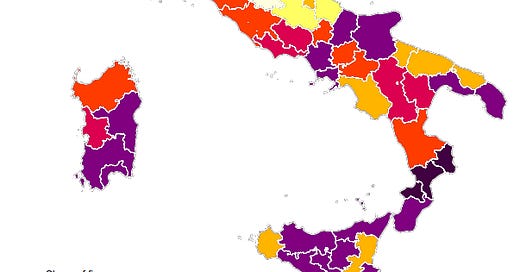Longtime readers will know that I have a weak spot for economic analysis of the mafia. In particular in Italy, there is now a sophisticated database of companies with mafia connections which allows to analyse which companies get infiltrated by the mafia and what effects this has on their business. But why do businesses go to bed with the mafia? After all, most companies where the mafia gets involved were originally set up as regular legitimate businesses.
Collecting data from a number of different databases, a team of researchers from the Bank of Italy, the London School of Economics and Yale University estimate that about 2% of companies in Italy have connections to the mafia. But only about half of these companies were infiltrated by the mafia from the get-go. As the map below shows, businesses that were born with mafia involvement are predominantly found in the mafia heartlands of Calabria, Sicily, and Campania, while the rest of Italy has predominantly firms that were founded as legitimate firms but were later infiltrated by the mafia.
Share of companies in Italy born with mafia involvement vs. total number of mafia firms
Source: Arellano-Bover et al. (2024)
Companies that were set up with mafia involvement are easy to describe. They tend to be smaller and mostly engaged in, let’s say, more volatile and riskier business ventures than companies that were born clean. In other words, these are the local construction companies, hospitality firms and ‘waste disposal firms’ that we tend to think of when we think about mafia firms.
But then there are larger firms which usually were born clean but later infiltrated by the mafia. Once the mafia gets involved in these firms, their business fortunes don’t change significantly, but their sources of financing do. Instead of getting bank loans, these businesses tend to get their loans from the mafia. Also, after the mafia gets involved, these businesses tend to hold higher levels of liquidity. As the research points out, the companies that do get infiltrated by the mafia tend to experience a significant decline in liquidity and a decrease in cash flows before the event. This indicates that these companies tend to experience a liquidity crunch and when the banks refuse to lend to them, these businesses go to ‘alternative lenders’. These ‘alternative lenders’ then use these legitimate businesses to launder their money and make a killing with the interest earned on the loans.
And finally, there are the largest companies in the sample of mafia-infiltrated businesses. In these companies, the mafia typically is not actively involved at all. Instead, the mafia uses these firms for two reasons. First, they are a great way to put excess cash to work and launder illicit gains. Second, and far more important, I presume, these legitimate firms provide Mafiosi with a network of legitimate businessmen. Get a seat on the board of a medium-sized or large company in Italy and you get to meet captains of industry and local as well as national politicians. In other words, once you are on the board of these companies, you gain influence. And with that influence you can ensure that the laws against mafia firms are not going to be enforced all too strictly and that the government enacts laws that benefit your business interests.
It is almost like the network of public school boys in the UK which controls both politics and much of the economy through its ‘relational capital’. At least that some people may think that. I couldn’t possibly comment…






Here’s another German who want Francis Urquhart back.